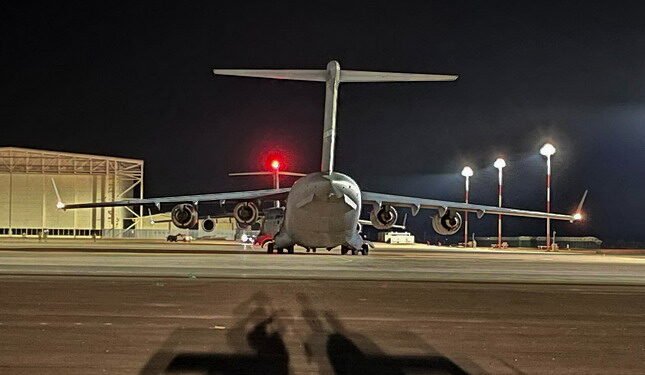
The US Department of Defence and the Nigerien Ministry of National Defence of the Republic of Niger have announced that the withdrawal of US forces and assets from Air Base 101 in Niamey is complete.
This transition began on 19 May with signing of the Terms of Withdrawal and ended on 8 July during a turnover ceremony with the Joint Disengagement Commission following the final departure of a US Air Force C-17 Globemaster III from Air Base 101.
Designated as a Cooperative Security Location by the US military, this Nigerien base has housed US personnel and assets to help counter violent extremist organisations in the region, US Africa Command (Africom) said in a statement.
“The effective cooperation and communication between the US and Nigerien armed forces ensured that this turnover was finished ahead of schedule and without any complications,” Africom added.
“With the closure of the US compound on Air Base 101, US forces will now focus on completing the withdrawal from Air Base 201 in Agadez. Both US and Nigerien officials are dedicated to completing a safe, orderly, and responsible withdrawal by 15 September 2024. They emphasise their commitment to the protection and security of American forces during this process. The US Department of Defence and the Nigerien Ministry of National Defence recognise the joint sacrifices made by both nations’ forces,” Africom concluded.
In an earlier statement, Africom said the withdrawal of US forces will not impact on ongoing development relations between the US and Niger. “Both countries remain committed to sustained diplomatic dialogue to shape the future of their bilateral relations,” a statement read.
Niger recently announced it was suspending military cooperation with the United States, after the July 2023 coup.
The first deployment of US troops to Niger was in 2013 when 100 military personnel were deployed and operated from a military base at Niamey airport which was shared with France. Washington later built one of its largest drone bases in Africa in Agadez-Niger. The base enabled it to carry out intelligence, surveillance and reconnaissance activities, which covered almost the entire Sahel region.
Since the Air Base 201 drone base was commissioned in 2019, it has been a major military asset to the US in the Sahel. Information gathered from the base has been essential in tracking and fighting insurgent groups operating in the region.
In addition to the drone base, the US also supported Niger with military aid before the military coup of 2023.
Before the military coup in July 2023, the US was a significant contributor of aid to the country. In 2018, the US committed $437 million to the country to strengthen Niger’s agricultural and livestock sectors. The US also supported the country’s fight against insurgency before the coup. The coup dramatically changed the relationship. In October 2023 (three months after the coup), the US cut off more than $500 million in assistance to Niger. This has affected the country’s security funding.
The second reason why Niger cut defence ties with the US, according to Olayinka Ajala, Senior lecturer in Politics and International Relations, Leeds Beckett University, is that the Niger junta came to the view that the US was no longer willing to work with it. Shortly after the coup, the US drone operations in Niger were limited to surveillance to protect US assets. The US stopped sharing intelligence with the junta in Niger, putting pressure on the junta to relinquish power.
This has hampered Niger’s counter-terrorism operations because intelligence sharing is essential in tracking and planning attacks against insurgent groups.
Tied to this has been the issue of the drone base. The base is a major source of surveillance and intelligence gathering. There is, however, a 10-year usage agreement which expires this year (2024). The junta might think it is the right time to sever the military relationship with the US so as not to renew the usage of the base. It is unclear what will happen to the drone base now that Niger is cutting ties with the US.
The US is now trying to establish new security cooperation agreements and considering countries such as Ghana, Côte d’Ivoire and Benin for American reconnaissance drones.
The Sahel region is a vast area and US surveillance drones have been useful in identifying terrorist locations. If the relationship between the US and Niger is permanently severed, surveillance and intelligence gathering will be seriously affected even if the US moves to other countries. This is because Niger is strategically located and the drones flown from the country could cover large parts of the Sahel and west Africa.
The fact that there has been an increase in terrorist attacks in Niger, Mali and Burkina Faso since the coup in Niger in 2023 suggests these fears might be justified, Ajala said in a piece for The Conversation.









